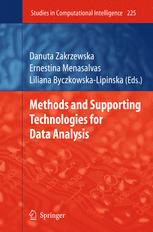

Most ebook files are in PDF format, so you can easily read them using various software such as Foxit Reader or directly on the Google Chrome browser.
Some ebook files are released by publishers in other formats such as .awz, .mobi, .epub, .fb2, etc. You may need to install specific software to read these formats on mobile/PC, such as Calibre.
Please read the tutorial at this link: https://ebookbell.com/faq
We offer FREE conversion to the popular formats you request; however, this may take some time. Therefore, right after payment, please email us, and we will try to provide the service as quickly as possible.
For some exceptional file formats or broken links (if any), please refrain from opening any disputes. Instead, email us first, and we will try to assist within a maximum of 6 hours.
EbookBell Team

5.0
70 reviewsTogether with the development of information technologies the requirements for data analysis tools have grown significantly. Due to such recent advances, as ubiquitous computing or the Internet of things, data modeling, management and processing become more and more challenging tasks. Users want to get complete knowledge from big amount of data of different kinds and formats in all possible environments. Full exploitation of the knowledge hidden in huge databases is possible only if we apply efficient methods of analysis what imposes rediscovering new techniques for storage, data warehousing, querying, extracting and mining.
The book explores the field by giving a coherent and comprehensive picture of the new developments in database systems. Consequently the presented approaches give an overview of the ways in which data has been stored, modelled, processed and analysed including the technical challenges for efficiency management. Special attention has been paid into applications taking into account such domains as the Web, image retrieval, education or electricity power generation. However the provided topics can be also developed and applied in many other areas , where database support and data analysis are necessary.
The book introduces the reader to the new challenges of databases, and is expected to be of special interest of researchers and professionals engaged in their development.